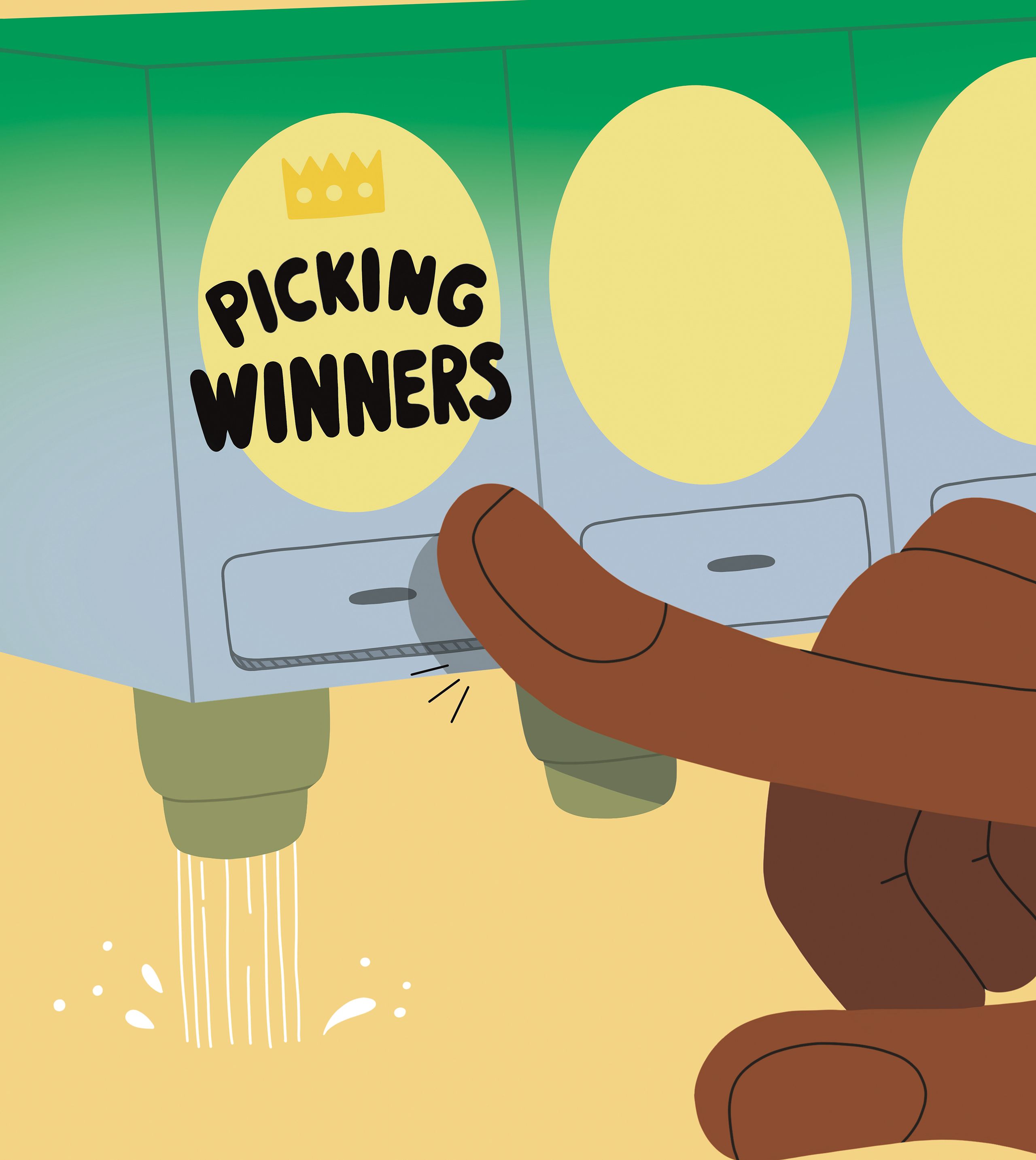Picking Winners
Working for a startup has never been more popular among new graduates. But how do you tell which company is likely to give you the best experience and network as you start your career?

“Picking the right startup means you have an opportunity to help shape that business. Often, you get a chance to develop an entire department – in a large corporation you would never have that opportunity, as all the structures and processes are set in place
We’ve all heard of Uber, Airbnb, and Deliveroo. But what about Beepi, Yik Yak and Jawbone? All of these startups raised vast sums of money in initial investments, but only some went on to become household names. For the others, the wheels fell off – in some cases spectacularly.
So, what is the magic ingredient that means some businesses become unicorns – privately held startup companies valued at more than $1bn – while most don’t? And what does that mean for anyone thinking of working for a startup – a career path that has never been more popular among new graduates?
First a word of warning: the risks are as significant as the rewards. According to the US Small Business Administration, the failure rate of startups in 2019 was around 90 per cent, with one in five failing during their first year and half gone to the wall by the fifth year. So, how to pick a startup winner – whether as an employee or an investor? What other rewards (besides that tantalising possibility of a bumper payday) does working at a startup offer? Will it help you build a network, or take on greater responsibilities than those found in traditional corporate structures?
First, discard your preconceptions. “Startups have been very romanticised over the past decade,” notes Miguel Burger-Calderon, Class of 2006 (2003-06), who worked initially at a tech-specialist investment bank before building Elite Daily, a millennial-focused digital publisher, and founding privacy compliance startup Ethyca. “But be aware of what you’re signing up to. Startups are a grind; you’ll be working long
days, nights, weekends – especially if you’re joining early. It’s really important that you love the product you’re working on. And make sure you’re aligned with the mission. Just imagine putting in those hours on something you’re not excited by.”
Along with passion, ensure you bring understanding, counsels Lucas Wittrup, Class of 2018 (2015-16), the co-founder and COO of new startup Squire. “Start, or join, something that you understand,” he advises. “We began Squire – an alternative way to find work – because we saw there was a clear lack of decent alternatives for fast employment that allowed individuals to control their own earnings and work hours. We explored how we could best tackle this gap in the market.”
While Miguel appreciated his early experience in the world of investment banking before launching Ethyca – “the MDs took us to lots of their meetings, I could build my network, and it’s where I met my future business partners”, he says – Lucas and his team are still remarkably young. “We’re five childhood friends, all under 22,” he says. “Some are still studying at university while also working on Squire full-time!” But rather than their age counting against them, it aligns them closely with Squire’s young user-base.
Startups may begin with single visionaries, but success is delivered by teams, so it’s important to look at the bigger picture of the team that’s in place. “Picking the right startup means you have an opportunity to help shape what that business looks like,” says Sophie Trelles-Tvede, Class of 2011 (2007-11). “Often, you get a chance to develop an entire department, starting with you, and then hiring a team for it. In a large corporation you would never have that opportunity, as all the structures and processes are set in place – you’re just one cog in a large operating machine. In a startup, you can build and implement those cogs.

“Startups have been very romanticised, but be aware of what you’re signing up to. It’s really important that you love the product you’re working on, and make sure you’re aligned with the mission. Just imagine putting in those hours on something you’re not excited by”
Sophie thinks choosing a co-founder could be an entrepreneur’s single most important decision. She chose fellow ZIS alum Felix Haffa, Class of 2011 (2006-09), to found Invisibobble: a 100 million-selling hair accessory company that landed both of them on the Forbes 30 Under 30 list just four years later.
But no amount of alignment, experience, or passion will save the startup entrepreneur from making mistakes along the way, and, as a potential or current employee, you may have to just accept that fact. “Once a mistake has already happened, panicking or getting frustrated doesn’t help,” says Sophie, who is also a founder of 300-employee beauty distribution company New Flag. “The team just needs to take a step back, reflect on the situation and make a decision about how you will course-correct. But it’s important this happens fast and you don’t sit on the decision-making for days.”
Squire hit its first major bump before launch. “We publicised our launch date with a largescale marketing campaign,” recalls Lucas. “But due to some final fixes that were needed, we were forced to delay. Luckily, we maintained strong communication with everyone on our waiting list, calling and emailing to assure them our release was right around the corner. The lesson: don’t get ahead of yourself!”
At Elite Daily, Miguel concedes the team “made most of the first-time entrepreneur mistakes one can make.” He offers up a list of hard-won advice about the sort of culture that will lead to success, however: “Be really clear about who the business is taking money from, as it will be detrimental in the long term if you’re not aligned with investors. If there are co-founders, it’s important to have the difficult conversations upfront: what are your strengths and weaknesses? Once the honeymoon period ends, every company goes through an immense amount of stress. And finally, don’t be cheap when it comes to lawyers! It’s OK to use a small shop for day-to-day operations, but you want a big firm for the big items such as fundraising, initial contract templates, HR and incorporation.”
For Miguel, it all paid off. The success of his ventures have enabled him to “switch sides” to become a fulltime investor, joining a fund to invest in disruptive companies with global impact. Vast Ventures is, he says, a “manifesto-driven venture fund” motivated by goals that include improving worldwide health and happiness, promoting resource sustainability, increasing empathy and connectedness, “and disrupting industries that resist these goals.”
That focus on sustainability, innovation and using investment to shape and accelerate a better world also drives current parent Michael Sieg, Founder and Group Chief Executive of ThomasLloyd Group. Michael founded the Zurich-headquartered company in 2003 and it has grown to become one of the world’s leading impact investors. “I founded ThomasLloyd 18 years ago after identifying that there was, and still is, a critical need for investment in sustainable real assets,” he explains. “While today everyone is talking about sustainability, climate change and impact investing, they weren’t a decade ago.”
As awareness has grown of the huge challenges posed by climate change and widespread inequalities, so the definition of a ‘good’ company to invest in or work for has shifted. “Investors are demanding transparency; being able to clearly demonstrate environmental, social and good governance credentials. People want to know where and how their money is being used, and who they are working for,” Michael explains. “This is part of a broader social change and takes multiple forms, from the exclusion of cluster munitions to the movement around creating tobacco-free portfolios. For me, a good company is one with strong leadership, a clear and compelling vision and, ultimately, doing something that makes a real difference.”
Michael echoes the vital importance of learning from challenge and failure. “I’ve focused on surrounding myself with a great team and fostering a culture of challenge, debate and candour. I embrace agility. If I fail, I fail fast and then I learn from it and move on.” But the greatest credit for his success he attributes not to nimbleness, vision or even luck, but to his family. “The support of my wife, Nermin, my daughter, Aleyna (Grade 4) and extended family has been critical. I could not have achieved what I have, and what I hope to achieve in the coming years, without them.”
Such acknowledgements might once have been rare in the pressured corporate environment, and especially so in the high-stakes business of cultivating unicorns. But there’s a growing awareness that healthy personal relationships – with family, friends, co-workers and, above all, with yourself – may be the longest-lasting route to success and satisfaction.
Self-reliance and self-compassion are essential for the risk-taking, impact-making startup entrepreneur or investor. “I’ve always backed myself in my decisions,” says Michael. “Once, founders could never show weakness,” says Miguel. “That’s changing, and I’m glad the trend now is to be able to show vulnerability and be mindful of good mental health. In the world of startups, it is increasingly acceptable to acknowledge that the lows can be very tough – though the highs, of course, are amazing.”



